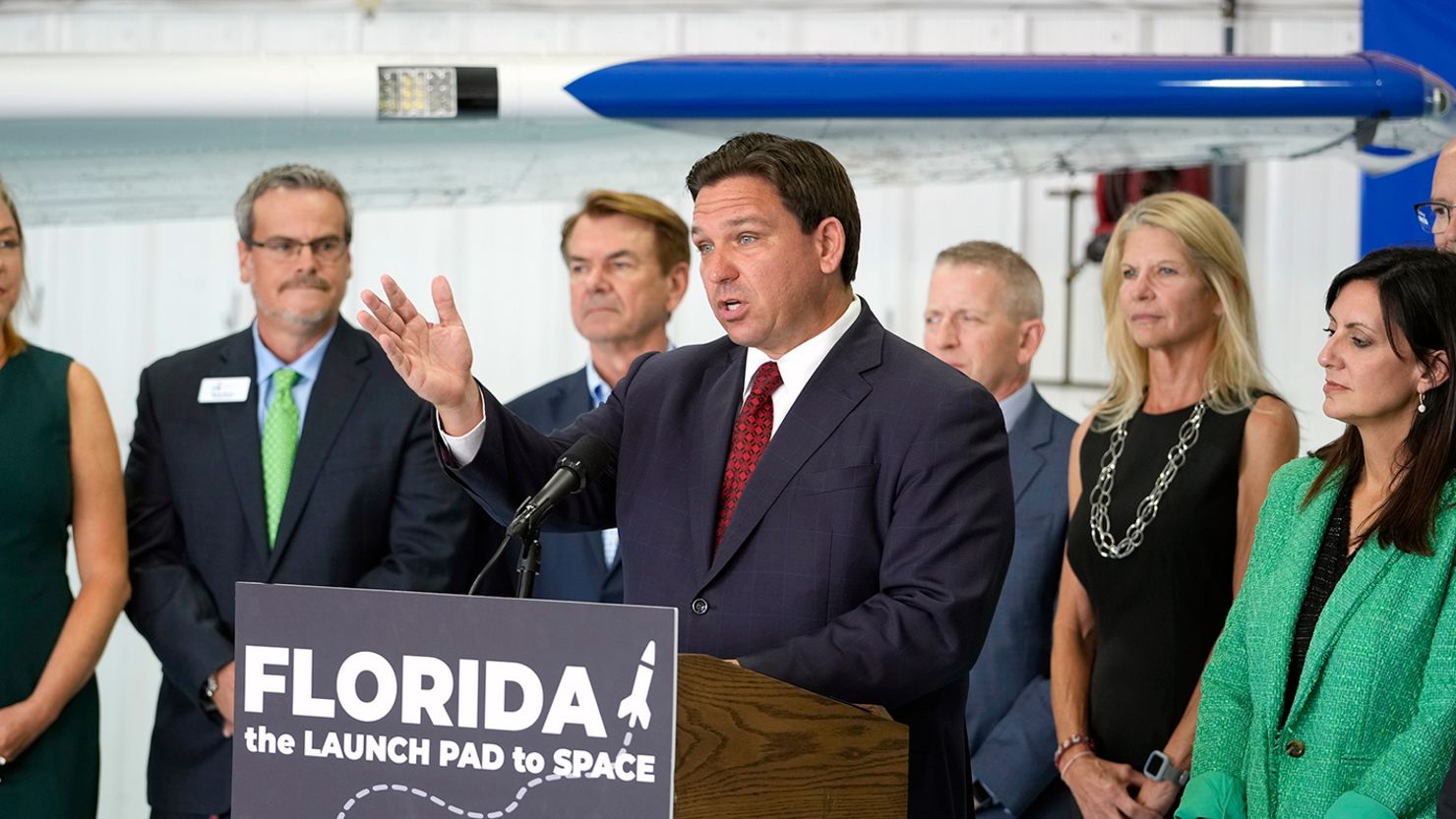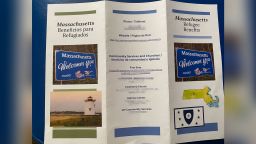The spreading push from Republican governors to relocate undocumented immigrants into blue enclaves marks a new escalation of the red state drive to seize control of national policy from below, not only on immigration but on a broad array of domestic policies.
The transfers, which exploded into the national debate with Florida Gov. Ron DeSantis’ move last week to deposit two planeloads of migrants on the vacation island of Martha’s Vineyard, constitute one prong of a pincer strategy from Republican state officials to commandeer the course of national immigration policy.
More from CNN
On one front, through the migrant transfers and an executive order from Texas Gov. Greg Abbott instructing state law enforcement officials to apprehend undocumented migrants, the red states are looking to expand their own authority over immigration enforcement which is traditionally an area where courts have provided almost complete primacy to federal power.
Simultaneously, shifting combinations of Republican-controlled states have launched a swarm of lawsuits, primarily before sympathetic Republican-appointed judges, looking to prevent President Joe Biden from unwinding many of the hardline immigration enforcement policies implemented by his predecessor, Donald Trump.
What links these twin policy offensives is a “deeper desire to create far more autonomy and authority at the state level over immigration matters, which traditionally has been absolutely encased in federal authority,” said Doris Meissner, a senior fellow at the Migration Policy Institute, who served as commissioner of the Immigration and Naturalization Service during Bill Clinton’s two presidential terms.
Even this comprehensive campaign to wrest greater control over immigration policy represents just one front in the much larger drive unfolding across states where Republicans control the state legislature, the governorship, or both.
These Republican state officials have moved aggressively since Trump’s defeat to unravel what legal scholars call the “rights revolution” – the steady procession of moves by the Supreme Court and Congress since the 1960s to nationalize more rights, from abortion to contraception to interracial marriage, and to reduce the freedom of states to constrict those rights. Since Biden took office, red states have moved en masse to pass legislation prohibiting or restricting abortion; making it more difficult to vote; retrenching LGBTQ rights; limiting how public school teachers can talk about race, gender or sexual orientation; and making it easier for critics to ban books from public school libraries. In this drive, they have received critical support from GOP-appointed justices on the Supreme Court and Republican senators wielding the filibuster to block Democratic efforts to codify national rights on abortion, voting and, likely, on same-sex marriage.
Taken together, all of these pieces – the torrent of socially conservative red state legislation; the flurry of lawsuits to constrain Biden’s ability to exert national power or to erase previously guaranteed national rights (like abortion); and the use of Republican filibusters to prevent Democrats from passing legislation restoring a national floor of rights amount to what I’ve called “an effort to define a nation within a nation – one operating with a set of rules and policies that diverge from the rest of America more than in almost any previous era.”
The moves by Republican governors to remove migrants in large numbers from red states to blue jurisdictions takes the idea of red and blue America as separate nations to a new, ominously literal extreme. To many critics, it echoes other examples of nations banishing unwanted populations across a border–as the US did with the mass deportations of undocumented workers to Mexico during “Operation Wetback” in the 1950s. Some even see in these actions echoes of the racist “ethnic cleansing” that has accompanied wars in Eastern Europe and is evident now in Ukraine.
“The red states are deporting people,” David Leopold, former president of the American Immigration Lawyers Association, told me. “It an attempt at an internal mass deportation. … The spirit of cleansing an area of certain people, is so un-American and so repugnant to everything this country stands for.”
In 2021, the Biden administration frustrated civil rights and voting rights advocates by standing back for months as red states imposed new obstacles to voting before shifting gears with lawsuits against some of the state laws, much harsher rhetoric from Biden, and a belated (and ultimately unsuccessful) push for national voting rights legislation.
Something of the same frustration may be building again around the red state relocations. Biden and other administration officials have forcefully condemned the migrant removals, particularly DeSantis’ relocation to Martha’s Vineyard. But White House and Department of Justice officials through Monday pointedly dodged questions about whether the administration was considering any legal or executive actions to combat the relocations. And with DeSantis pledging more such flights, and Abbott and Arizona Gov. Doug Ducey continuing to bus migrants to blue jurisdictions, the White House is likely, sooner than later, to face growing questions about whether it is doing enough to push back.
“They should use every tool in their toolkit, including litigation, to stop red state politicians from seeking to wrest that control that belongs with the federal government,” said Jane Bentrott, a lawyer at the Justice Action Center, an immigration advocacy group based in California.
In turn, the Republican governors argue that they are only acting to protect their states from the impact of what they universally call Biden’s failure to secure the border. “Instead of their hypocritical complaints about Texas providing much-needed relief to our overrun and overwhelmed border communities, President Biden and Border Czar [Kamala] Harris need to step up and do their jobs to secure the border – something they continue failing to do,” Renae Eze, Abbott’s press secretary, said in an emailed statement.
Immigration experts across the ideological spectrum agree that the large flow of asylum seekers and other undocumented migrants has created enormous strains for communities near the Mexican border. “This is an unsustainable situation at the border,” Meissner said. “It’s unsustainable for Customs and Border Patrol, for the administration, for critics of the administration, for the country. Even though we can as a country take very large numbers of people … this way of doing it is not sustainable. It’s just not the right way to be doing business.”
But most experts also agree that the question of whether the burden of responding to the migrant flow should be more widely shared across the country is a very different issue than whether the Republican governors are justified in shipping large numbers of undocumented people to other cities without notice or planning. Abbott’s office said Texas has already bussed more than 10,000 migrants to other cities, in some cases dropping them off on sidewalks without providing any notice to the receiving jurisdictions.
Leopold said the fact that the migrants “are being shipped across state lines … right there triggers federal jurisdiction.” But Meissner said the pivotal issue in determining whether the transfers are violating any federal laws “probably comes down almost entirely” to whether migrants consented to the trips or were coerced or misled to participate.
In response to written questions, Abbott’s office provided a copy of a waiver it said all of the bussed migrants have signed in which they “agree to be transported by the State of Texas or its designated agency officials to locations outside of Texas.”
“These migrants willingly chose to go to Washington, D.C., New York City, or Chicago,” Eze said.
Meissner agreed that even if shipping undocumented individuals to other cities without any coordination is questionable policy and “fiendishly cynical,” it’s likely “a lot of migrants were entirely willing and pleased to be able to get this bus transportation because in the normal course they are responsible for paying for their transportation once they are in the country.”
The flights to Martha’s Vineyard that DeSantis organized are drawing more scrutiny precisely because of indications the migrants on board were misled about where they were going and promised work and housing benefits that never materialized. In a letter last weekend to the US attorney for Massachusetts, a legal group representing some of the migrants wrote, “Our clients were induced to board airplanes and cross state lines under false pretenses. Individuals, working in concert with the Florida Governor, made numerous false promises to our clients, including of work opportunities, schooling for their children, and immigration assistance, in order to induce them to travel.”
The group, Lawyers for Civil Rights Boston, said the flights potentially violated several federal laws and called on the Justice Department to open a federal investigation. “This type of conspiracy to deprive our clients of their liberty and civil rights and interfere with federal immigration proceedings must be thoroughly investigated for violations of criminal laws,” the group wrote. On Monday evening, the county sheriff in Bexar County, TX, which is centered on San Antonio where the flights originated, announced that he is launching an investigation into the maneuver.
Apart from the question of whether the flights triggered any criminal liability, immigration advocates also want the administration to pursue a federal court injunction stopping future transfers. “I am quite confident that this is enough of an interference with exclusive federal responsibility [over immigration] that they could take action,” said Thomas Saenz, the president and general counsel of the Mexican American Legal Defense and Educational Fund.
Like Abbott, DeSantis has insisted that no migrants were misled, all participated voluntarily, and the flights represent a justified response to “reckless” Biden immigration policies. “We’re continuing to … use every tool at our disposal to insulate the state of Florida from the negative ramifications” of the Biden administration’s policies, DeSantis declared last week.
The flights fit into a pattern of red states pushing at the boundaries of federal authority over immigration policy. In July, Abbott signed an executive order authorizing Texas law enforcement officials to return migrants they find in the state to ports of entry at the border. (Abbott’s office cited that executive order Monday as the legal authority for the program of bussing migrants out of state.) To critics, that executive order represents a clear intrusion into federal control of immigration enforcement.
The Supreme Court as recently as 2012 reaffirmed the primacy of federal authority over immigration law in a case striking down a hardline Arizona statute that also empowered state police to target undocumented immigrants. “The National Government has significant power to regulate immigration,” the court majority wrote at the time. “Arizona may have understandable frustrations with the problems caused by illegal immigration … but the State may not pursue policies that undermine federal law.
Meissner said that through the migrant transfers, and especially the Texas executive order authorizing state law enforcement to apprehend and relocate migrants, the Republican governors may be trying to create a legal test case that would allow the new, more conservative Supreme Court majority to overturn that decision. That’s what red states did by passing the severe abortion restrictions that ultimately created the Mississippi case the justices used to overturn Roe v. Wade.
With its immigration enforcement directives, Texas “may be purposely overreaching in the way that has been done with the abortion case for years and years in order to generate a lawsuit that then can get to the Supreme Court with the view that this Supreme Court would rule differently on that precedent,” in the 2012 Arizona case, Meissner said.
These red state challenges to federal primacy over immigration enforcement come even as shifting combinations of the same states are pursuing multiple lawsuits to constrain federal authority and to prevent Biden from changing hardline Trump policies. Bentrott said her group counts at least 20 active lawsuits from different coalitions of red states against Biden’s immigration policies. As part of that offensive, immigration advocates are bracing for a decision from the Fifth Circuit Court of Appeals within weeks, if not days, striking down the DACA program that provides legal protections to young people brought to the country illegally as children.
Amid all of these provocations, the Biden administration has generally dodged full-scale confrontation with the red state governors over immigration. The Justice Department has won a temporary federal injunction against one aspect of Abbott’s immigration agenda – a mandate for state troopers to pull over private vehicles believed to be transporting migrants who might be infected with Covid.
But while Biden criticized last week’s flights, and Rachael Rollins, the US attorney for Massachusetts, has said she will look into them, the administration has conspicuously avoided promising legal action. And the Justice Department has not filed suit against Abbott’s broader executive order authorizing state law enforcement officials to move undocumented migrants to the border, even though many immigration lawyers consider it a clear violation of federal primacy.
Frank Sharry, executive director of America’s Voice, an immigration advocacy group, said the administration’s muted response likely makes sense from a short-term political perspective. “In the cold calculus of midterm elections, Biden and most Democrats have decided to close on abortion and ignore immigration,” he said. “They do not want to give oxygen to a desperate GOP attempt to change the subject.”
Yet the choice not to fully engage, Sharry said, carries a long-term cost in terms of making it more difficult to consider any comprehensive response to the immigration dilemma – like the bills that passed the Senate with bipartisan filibuster-proof majorities in 2006 and 2013 that coupled tougher enforcement with a pathway to citizenship for millions of undocumented migrants. “You can’t win an argument you don’t engage in,” Sharry argued, “and leaving the framing of the issue to the GOP and Fox means you – and our issue – will lose a great deal of ground.”
With these aggressive new maneuvers from DeSantis and Abbott, immigration has now joined issues such as abortion, voting and LGBTQ rights in the red state attempt to carve out a separate sphere of influence that sets its own rules and repels federal attempts to maintain a national baseline of guaranteed rights.
“There’s absolutely no doubt that what is going on is a kind of tug of war between Washington and state capitals about where the balance of power is going to go,” said Donald Kettl, a professor emeritus of public policy at the University of Maryland and author of the 2020 book, “The Divided States of America.”
Previously the sharpest division among the states, of course, came in the years before, during and after the Civil War when first slavery and then the federal efforts to protect rights for the freed slaves during Reconstruction sundered the north from the south. But experts like Kettl note that today’s divisions involve more states, and span more issues, than even those divides. By, in effect, deporting undocumented migrants from red areas to blue ones, Abbott and DeSantis have underscored how thoroughly they view blue America as fundamentally a different country than their own.
“We tend to look at the theater that Abbott and DeSantis have staged,” Kettl said. “But there are more fundamental battles at play here and there is very little attention being given to them … or where this is likely to take the country.”





